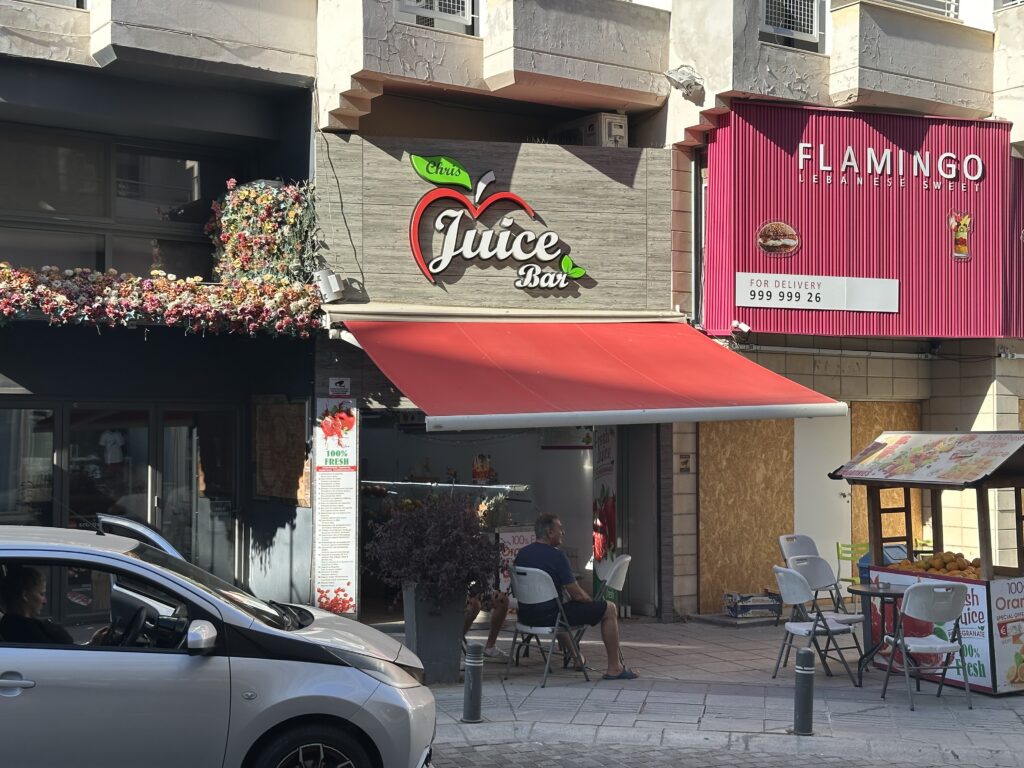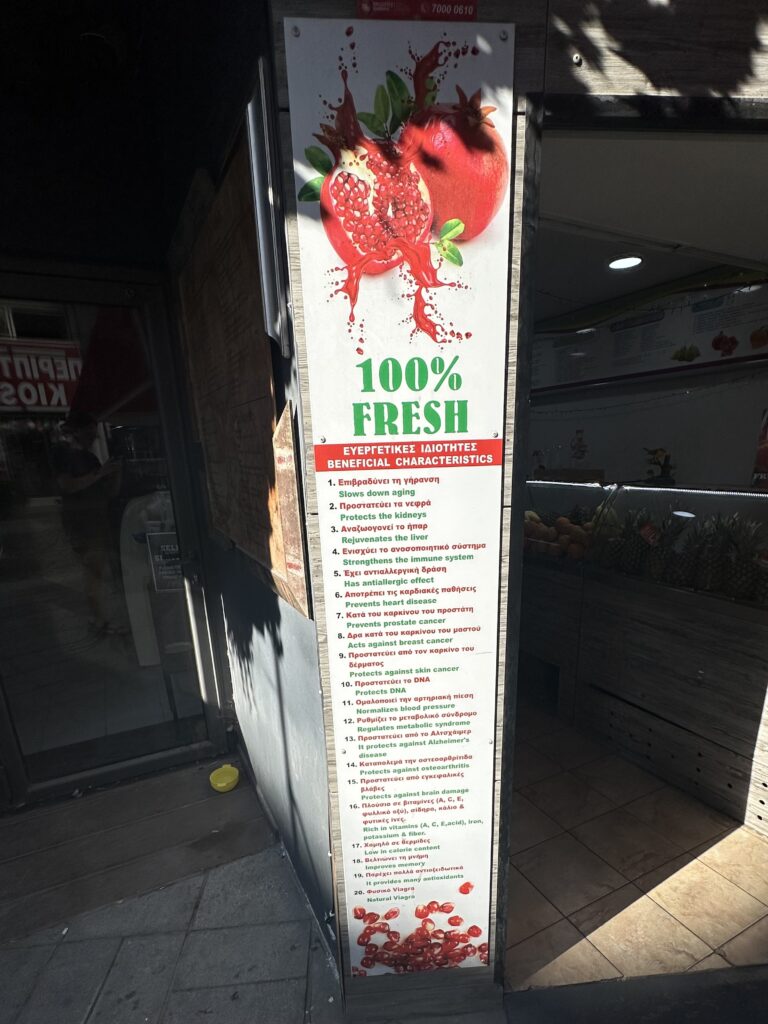Aoife Raney

Chris’ Juice Bar, a small shop just across from our hotel in Larnaca, is an essential part of the Vigla Archaeological Field School. And for good reason: after a long, hot day on site, Chris can serve up a smoothie that will satisfy like nothing else. Often, as dozens of thirsty students and professors pour out of vans and towards the juice bar, a significant line forms. When waiting in this line, one’s attention is drawn to a large sign placed just outside of the store. It is a list of twenty items, all of which purport to be the remarkable benefits of just one fruit among the dozens Chris can provide–pomegranate. A number of these claims, “slows down aging,” “protects DNA,” and “natural Viagra” to name a few, seem dubious. On the whole, the list seems exaggerated, but mostly rooted in science. However, I am not interested in the truth. I want to know, what is this sign saying? How does it think I should live my life? What I should value? I should drink Chris’ pomegranate juice because it will bring upon me these myriad blessings, but why are these the things I should value?

The list of “beneficial characteristics” is as follows:
- Slows down aging
- Protects the kidneys
- Rejuvenates the liver
- Strengthens the immune system
- Has antiallergic effect
- Prevents heart disease
- Prevents prostate cancer
- Acts against breast cancer
- Protects against skin cancer
- Protects DNA
- Normalized blood pressure
- Regulates metabolic syndrome
- It protects against Alzheimer’s disease
- Protects against osteoarthritis
- Protects against brain damage
- Rich in vitamins (A, C, E, acid), iron, potassium & fiber
- Low in calorie content
- Improves memory
- It provides many antioxidants
- Natural Viagra
One of the list’s core concerns is living a long and healthy life, especially by preventing disease. Most of its items are concerned with this pursuit. A large portion (6, 7, 8, 9, 12, 13, 14, 15) explicitly claim to prevent or fight against particular diseases. Interestingly, it is claimed that pomegranate can wholly prevent heart disease and prostate cancer, while the remaining diseases receive more cautious language. Pomegranate can only “protect against,” “regulate,” and “act against” things like Alzheimer’s, skin cancer, and breast cancer. I struggle to see a trend in which diseases are claimed to be more well prevented by pomegranate. Perhaps the difference in word choice was only for variety. The word choice does seem to lose its certainty as the list goes on. Maybe the heaviest hitting pomegranate facts were placed near the top of the list where more people would see them. This idea is complicated by the list’s final item – “Natural Viagra.” I can only imagine Cyprus’ many grumpy old men would be eager to hear of this information.
Another portion of the list’s items deal in somewhat more vague terms, shifting from naming diseases to broader benefits, things most people consider to be healthy, even if they don’t quite know why. Things like vitamins and antioxidants. I know I need Vitamin D, I don’t know what it does in my body. I’m a GLAM major. One more problematic item in this category is “17. Low in Calorie Content.” Of course, this is drawing from ideas about food and bodies that have permeated our culture for decades, but that does not excuse it. Am I expected to be coming to Chris’ Juice Bar to efficiently get my vitamins in as few calories as possible, and not to be nourished and delighted?
A similar set of items describe broader benefits of pomegranate to the body: “4. Strengthens the immune system,” “18. Improves memory.” These items serve a different utility to their disease-specific counterparts. For one, they allow a reader with specific wants more direct information. Someone deficient in Vitamin D now knows to buy Chris’ pomegranate juice. At the same time, listing the good parts of pomegranate rather than its good effects tells a reader without any of the specific ailments listed that the fruit will broadly do them well. This set contains an interesting discrepancy, saying that pomegranate “2. Protects the kidneys” and “3. Rejuvenates the liver.” Why does the sign assume its readers’ kidneys are unblemished but their livers are already in need of rejuvenation? As of 2019, Cyprus had the 55th highest alcohol consumption per capita, and the island sees many a drunk tourist. Perhaps the sign expects a reader who drinks regularly, although I do not know if that would translate to a concern about the health effects of alcohol. Maybe the reader should be emboldened to drink more, safe in the knowledge that their liver is protected by Chris’ pomegranate juice.
The remaining portion of the sign takes us into the absurd. Items which amuse or say very little at all about the health benefits of pomegranate. The heavy hitters here are “10. Protects DNA” and “20. Natural Viagra,” and they betray a side of the pomegranate sign we have yet to see. Item ten does seem to have some scientific merit, but from an untrained reader, huh? I need to protect my DNA? This item is the natural extension of the sign’s concern with life and health. Not only can pomegranate juice help you in living a good life, its effects will play a part in what you pass on to your progeny. Item twenty ostensibly relates to these issues of extending your life through those of your descendents. But in tone it stands in stark contrast to the rest of the sign. Twenty items in, after enumerating so many of pomegranate’s health benefits, the sign makes a final appeal less to health and more to pleasure. It asks, what is a long and healthy life if one does not indulge? Perhaps pomegranate juice has benefits beyond just the utilitarian.
Another detail of item twenty stands out to me–this is natural Viagra. Why not just take actual Viagra? For that matter, why not a multivitamin? The sign argues for an inherent superiority of the natural. Does this betray a more sinister side of the pomegranate sign? Is it, by promising the cure to myriad diseases, in some way exploiting those who suffer from them? Is it taking credibility away from science-backed, biomedical services, or can the two exist together?
All in all, Chris sells a small bottle of pomegranate juice for five euros when you can get a big smoothie for four. Not worth the DNA protection, at least for me.
